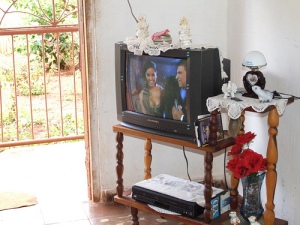
Devoid of Internet and cable TV, people in Cuba get by as best as they can. Newsagents don’t sell foreign newspapers. And if you want to be properly informed, the only way is to listen to the BBC from London, Radio Exterior from Spain, or the Voice of America, from the United States. And that’s it.
Over the last 50 years, the Castro brothers have put a fat lock on information. Zero sports from the Yankees. No news from abroad, if they criticize the Castros, or what is going on the island, even in the slightest. In the dollar stores, short wave radios have “mysteriously” disappeared.
But the regular Cuban in the street wants to learn what he doesn’t know, whatever way he can, even if he has to sacrifice his grub. One of the most lucrative businesses nowadays is to hire out a bunch of foreign TV channels for 10 CUC a month (250 pesos). In Cuba, this is called “renting out your antenna”. Or simply “the antenna”.
If you ask Roberto, he will tell you with a faint smile that “in the five years I have been hiring out the antenna, I have made enough money to buy my motorbike, refurbish my apartment, and eat meat every week.” And this, in a Cuba stuck in an endless Special Period, is plenty.
And, what’s more, he boasts of being well-informed. Usually, the program listings offered by those renting out the Cuban cable, are full of B movies, mediocre Mexican soaps, Spanish humour shows and baseball games from the Major Leagues.
But some offers include news programmes from Univision. “Some people only want to rent CNN in Spanish, ABC, NBC and ESPN. This sort of people pay double, 20 CUC a month”, states Roberto.
The antenna business is a sort of local Facebook, and it sprung up out of the strong desire – and need – for having an alternative to the highly-manipulated news fed on a daily basis by the regime. To avoid state television, which is generally boring and full of tired shows.
“It all begins when some friend or relative from the other side of the Florida Strait pays for a bundle of cable programs, preferably in Spanish. Then, the TV signal receptors are smuggled into Cuba. Once they are here, there are some people who make a living building rustic antenna dishes,” Roberto explains.
“When you have all the gear, that is, the receptor and the dish, then you begin to offer the private cable service to your neighbours. The demand is huge, because even if they are living it rough, many people would make sacrifices to see a different way of life.”
The owner of the antenna connects up all the houses using a coaxial wire. In Havana, you can find people in the business of renting out antenna who have more than 100 homes linked up.
You can do the math! No less than 1,000 CUC (25,000 pesos) a month. That is why, despite the joint efforts by the Cuban intelligence and the police to curb the boom in private antennas, they have achieved little. If they catch you, they can fine you up to 30,000 pesos (1,250 CUC). And if you are a repeat offender, you can even go to jail for up to two years.
But it is a good business, and people like Roberto take the risk. There are hundreds of anecdotes to tell, such as a firefighting station, whose staff enjoy free cable TV in return for their silence.
The regular Cuban on the street wants to be informed and entertained. He doesn’t mind if he doesn’t have pork or vegetables on the table. It is worth it to sacrifice them to watch, with his very own eyes, what is happening on the other side.
And frequently they find out what happens in their own country through the foreign media. When there is no internet and foreign media, the business of hiring out antennas is a sort of social network. The Cuban Facebook.
Iván García
Translated by: trelex
